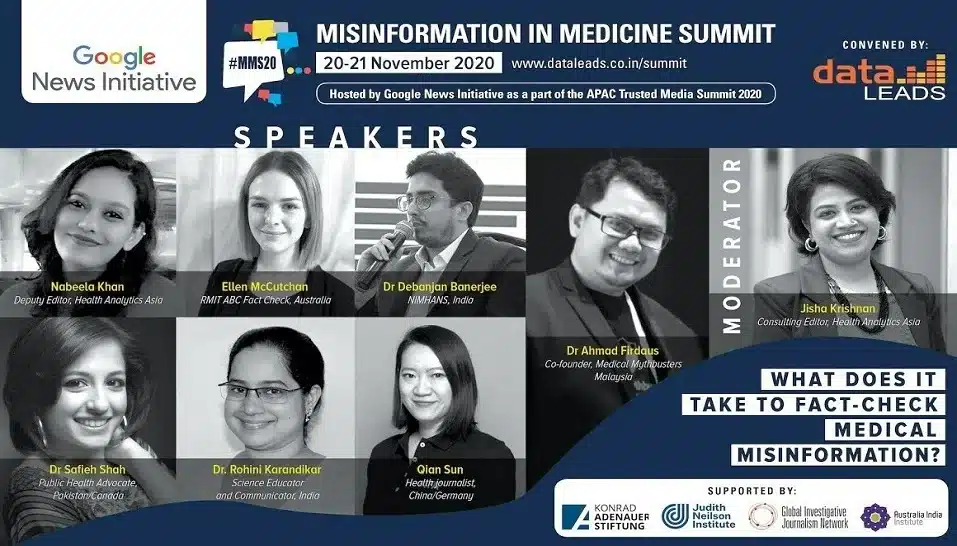Top fact-checkers from Asia share personal stories, deep insights, and practical tips to tackle the avalanche of health fake news at the Misinformation in Medicine Summit 2020.
What does it take to fact-check medical misinformation? The question has been at the heart of most deliberations worldwide during the COVID-19 pandemic. At the Misinformation in Medicine Summit 2020, we got together seven experts from across Asia to weigh in on the subject with lightning talks.
As the moderator for the session, I was excited to hear the eclectic group of fact-checkers – each doing amazing work in their respective regions – share personal stories, deep insights, and practical tips to tackle the avalanche of medical misinformation.
Ellen McCutchan, the editor of CoronaCheck, RMIT ABC Fact Check, Australia’s email newsletter, admitted that sifting through the conspiracy theories and miracle cures vis-à-vis the coronavirus infection have been a huge challenge. “It’s not just about social media monitoring, but also about stories in traditional media. The views of politicians – some are more problematic than others – as well as family and friends need to be addressed too,” said the journalist.
Dr. Ahmad Firdaus, Co-founder, Medical Mythbusters Malaysia, noted that it was important to focus on “the harmful stories” as opposed to “the harmless myths”. For instance, in Malaysia, the folklore forbids one from taking an evening shower. While it may be unscientific, there is no real harm done. “It may help save electricity,” he quipped.
The pandemic has been an eye-opener in many ways. It has put healthcare at the global centre stage, making us acutely aware of the consequences of false narratives. “Human beings have a desperate need to know. Information is what drives us,” said Dr. Debanjan Banerjee, a psychiatrist with NIMHANS, Bengaluru, who is keenly exploring the psychology of misinformation.
What is the source of medical misinformation? How do dubious claims go viral on social media? Qian Sun, a health journalist from China, who is currently working in Germany, asserted that the root cause is the lack of credible media. “In China, we have seen how that is the hotbed for misinformation. People go to social media to get news,” she explained.
The sad reality of the late Chinese doctor who was reprimanded for “spreading rumours” when he tried to warn the world about the emergence of COVID-19 in December 2019 is a grim reminder of how the system works.
However, contrary to popular perception, misinformation is not a new phenomenon. Dr. Safieh Shah, researcher and public health advocate from Pakistan, now practising in Canada, shared examples from the anti-vaccine movement way back in 1856 against the Smallpox vaccine to make a pertinent point. “You need to build a mental barrier between yourself and any content you consume,” she maintained.
“Google search is not the same as research. Also, be wary of predatory journals,” warned Dr. Rohini Karandikar, science educator and member of the Indian Scientists’ Response to COVID-19 team, with the Hoaxbusters’ group in Mumbai, India.
Nabeela Khan, Deputy Editor, Health Analytics Asia, empathised with the need for better collaboration between healthcare experts and journalists to ensure easy access to verified, agenda-free medical information for the readers. She spoke about the conception of First Check, the award-winning fact-checking initiative that not only debunks online medical misinformation but also brings together experts from different domains on a common platform.
“First Check, currently, has over 30 members from across 13 Asian countries,” said Nabeela. Incidentally, Dr. Ahmad, Dr. Debanjan, Qian, Dr. Safieh, and Dr. Rohini are part of this unique pan-Asian network that’s at the forefront of fighting medical misinformation.
You can watch the recording of the session here.


















Add Comment